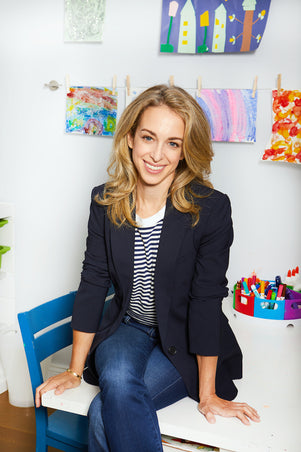Your kid is on a playdate when you hear: “No, that’s my truck!”, “You can’t be on our team,” or “I only want to play tag if I don’t have to be ‘it’!”
Sound familiar? You’re not alone. While playdates can help our kids build friendships and give parents a welcome break, they also bring up issues around sharing, exclusion, “bossiness,” and much more. So, what’s a parent to do when playdates get tricky?
I’ve got you covered. I’m Dr. Becky Kennedy, a clinical psychologist, mom of three, and founder of Good Inside, the all-in-one platform giving parents solutions and support at their fingertips— whenever and wherever you need it. The Good Inside approach helps parents navigate everyday situations—like playdates—while building critical life-long skills in kids, like empathy and resilience. And you’re about to get a peek into how it works with some of my go-to playdate strategies and scripts. Ready? Let’s get started.

Playdates can help kids build friendships and life-long skills
A Big Idea
First, let’s ground ourselves in a foundational idea: We must understand before we intervene.
Behavior is just the surface of our child’s experience. If we want to create long-term change, we need to get curious about what’s underneath behavior: “What’s happening for my child who refuses to share?” or “Why might two friends leave another friend out?” These questions reframe our kids’ struggles as good kids having a hard time, not bad kids doing bad things. This reframe is critical to making long-lasting, meaningful change.
Something else: We want to understand what’s going on for us during tricky playdate situations, too. If you’re like me, you can often get caught in “fast forward mode.” We see our child struggle today (with sharing or including others) and then fast forward a few months… or years… or decades, worrying, “My child will never have any friends!” or “Will my kid be a bully?” When we get caught in a fast-forward thought, we tend to respond to the situation in front of us based on our own anxiety, rather than on what is actually happening in the moment. Join me in taking a breath and reminding yourself, “I have a young child who is figuring out how to share or include others, and struggling along the way. This is a normal part of development.”
This is how we do everything at Good Inside: By focusing on the child behind the behavior and the person behind the parenting, our approach leads to substantial change… on the inside and the outside. Now, let’s get into a few specific examples.
When Kids Refuse to Share
Here’s a reframe: Struggling to share means our kids are learning how to recognize and communicate their desires. And that’s healthy! Instead of forcing them to share, we can teach them how to balance their wants with others’ wants.
- Allow choice. Before a playdate, ask your child, “It’s hard when friends come over and play with our toys! Do you want to put away some toys in your room and keep some out for sharing?”
- Encourage turn-taking. Be the referee. Say, “Looks like Aliyah wants that truck, too. When you’re finished, please let her know,” rather than “Aliyah is sad! Let her have the truck!”
- Set boundaries. If your child hits or grabs, take them out of the room: “I won’t let you hit. It’s hard to make safe choices right now. I’ll stay with you here until your body feels calmer. Then we can go back and play.”
When Kids Feel Left Out
We can’t control if our child is left out, but we can make our child feel less alone. Resilience is built by tolerating—not fixing—uncomfortable emotions.
- Support, don’t solve. Tell your child, “Feeling left out stinks. I believe you. I’m right here with you, and I know we’ll get through this together.”
- Focus on the present. When we see our child struggle in playdates, we often jump to thinking, “What if they have no friends when they’re 25?!” Remind yourself, “This is a tough stage and my kid will figure it out. This experience isn’t a predictor of their future.”
When Kids Are “Bossy”
To get the best out of our kids, we need to see the best in them. Instead of using labels like “bossy,” try, “My kid is a good kid having a hard time with flexibility.” This mindset helps you support an assertive child without shutting down their strong sense of self.
- Validate their feelings. “Ugh, you really wanted to play tag, huh? You had a fun idea, and it’s so hard when your friend has another fun idea! I know.”
- Build frustration tolerance. “Here’s something else I know: You’re a kid who can figure out tricky situations.”
- Model struggling with flexibility. Outside of the playdate, model flexibility in front of your child: “Oh, you want pizza for dinner? But I really, really, really wanted chicken! Maybe I could be okay with pizza. No, no, no, I want chicken! Hmm…This is hard… I guess I could make chicken tomorrow...”
More Support for Playdates (and Everything Else)
Sometimes reading new ideas like this feels like enough. Sometimes it feels like just the beginning.
If you have more questions about playdates or anything else parenting throws your way, I’ve got answers. With step-by-step guides to meltdowns, power struggles, anxiety, sleep, food, potty learning, and more, Good Inside gives you the skills to become the parent you want to be in the moments that matter most. Get started with 15% off membership!
Check out Dr. Becky's favorite toys for helping kids learn life-long skills, like resilience and confidence, through play!










